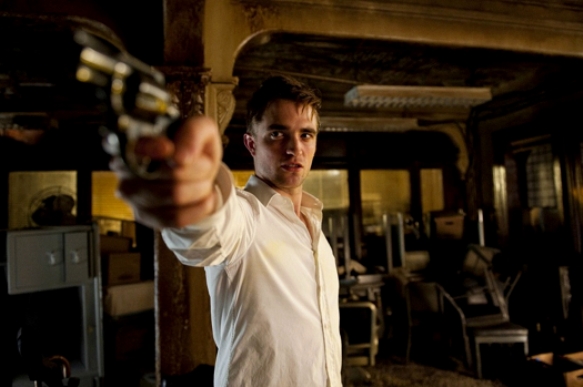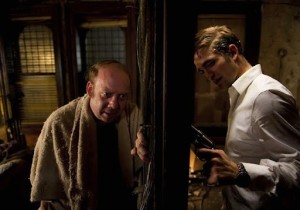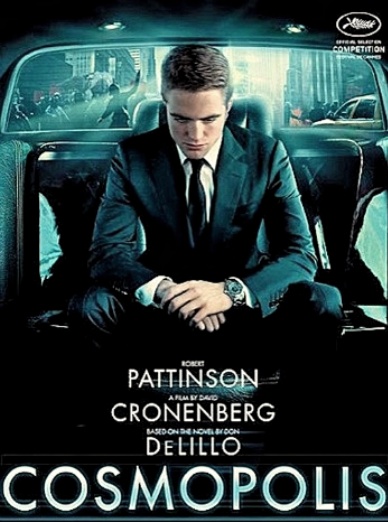
A work of genius… but it’s no good. At least not in the traditional sense. Cosmopolis is based on the novel by Don DeLillo but has now become the intellectual cinematic property of David Cronenberg. Cronenberg, the master, who has delivered one masterpiece after another since 1996’s “Crash.” A film by him that doesn’t completely work-cum-satisfy doesn’t mean the same compared to non-art films or trifles or overblown action shoot ’em ups. If you’re a Cronenberg fan it’s still worth acknowledging. Perhaps in a year, I’ll revisit it myself.
In this cold, sleek allegory, Robert Pattinson is a 28-year old billionaire bored by money, trapped by ennui, detached from mankind. That hardly sums up the rest of the film’s vexing garble of dialogue, or [endlessly] twisted monologues. You see, strange archetype people jump in and out of his vehicle – not realistic, it’s all conceptual. Yet the genius: So many brilliant ideas about money, power, globalization… and sex. Meaningless, let’s-feel-something-sex to awaken the deadness of the soul within.
With intractable determination, the man who has everything wants a haircut on the other side of Manhattan while a presidential motorcade has slowed traffic to a snail’s pace. Cronenberg carefully frames his shots so you can see the pitiful and lowly of the proletariat through the limo’s windows. Then the avante-garde touches: the hostility, the revolution of the masses outside. The lower middle class succumbing to poverty before our eyes in one limousine ride, those classes becoming symbolic and metaphorical rats. Packer says something eventually how money will cease its importance and the rat will become the new currency. We are all enslaved by a system.
But cinematically, I got claustrophobic inside that post-modern gizmo stretch limousine where the majority of the film takes place, and was relieved when our protagonist Eric Packer steps out of it on occasion (usually to converse with his wife whose interest is books and disinterest is sex). Pattinson, who engages in three graphic sex scenes, assures me he is a superb actor in the way he responds as a human cipher – a life made too easy by technology and high-speed finance – yet the actor respects the allegorical nature of his character, too. Eric Packer isn’t likeable, he’s a conduit of social commentary. Pattinson is on the same page as Cronenberg.
Let’s consider those sex scenes for a moment, since they are visually exciting. The woman typically is mounting and riding him, while he reclines back. Motion and activity are of almost nuisance to a billionaire who has everything. The women that parade into his vehicle are there to entertain him, and to ride him is to work at entertaining him. Or something, he’s not easily wowed. Getting sex with his wife, for once, is one of the few paltry challenges he has going for himself. He spends various elliptical episodes flexing his wit and intellect to seduce his aloof, frigid wife. This is dark humor. After one episode of sex with another woman, he wants to be zapped by a taser gun just so he can feel surprising sensation that’s missing from his languid life. This is dark abstract drama.
If there is one sequence I really want to see again it is the one where Samantha Morton pops in abruptly, and muses on the interlink of time and money in the new millennium. The pasty-white but cerebrally gifted Morton is mesmerizing. But the idioms zings so fast, that you’re unable to hatch on. Like the rest of it, many other scenes have mesmeric, little genius passages, too. But it’s all so left-and-right, out of sight, and amorphous, that nothing sticks.
 A mortal gunshot outside of a basketball court has had me in a quagmire for a week after I saw it. I think I know what it means, but if I do, it’s rather glib. Yet I have found myself in multi-theory over it, and every time I come back around it seems hypocritical and contrast when considered against the ultimate incident of the film. The long square-off between a homicidal sad-sack (Paul Giamatti) and Packer is talky and dyspeptic – again with peculiar and interesting symbolic terminology. But really, it is dully staged by Cronenberg, and lit in moldy browns and pale yellows. And Cronenberg usually startles us with his climaxes, but “Cosmopolis” is the rare one that tumbles into torpor.
A mortal gunshot outside of a basketball court has had me in a quagmire for a week after I saw it. I think I know what it means, but if I do, it’s rather glib. Yet I have found myself in multi-theory over it, and every time I come back around it seems hypocritical and contrast when considered against the ultimate incident of the film. The long square-off between a homicidal sad-sack (Paul Giamatti) and Packer is talky and dyspeptic – again with peculiar and interesting symbolic terminology. But really, it is dully staged by Cronenberg, and lit in moldy browns and pale yellows. And Cronenberg usually startles us with his climaxes, but “Cosmopolis” is the rare one that tumbles into torpor.
“Cosmopolis” is so esoteric that it will often be too obtuse for the audiences that go intentionally searching for conundrums. It’s simply not entertaining in full, but if you’re a devotee of Cronenberg you still will want to watch this movie anyway. Ponder over it, chew on it, and be dazzled in retrospect by the sheer attempt of it.
108 Minutes. Rated R.
SCI-FI & FANTASY / MIND-BENDER / SATURDAY NIGHT WEIRDNESS
Film Cousins: “Naked Lunch” (1991); “Crash” (1996); “eXistenZ” (1999); “Spider” (2002).






